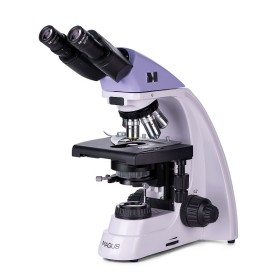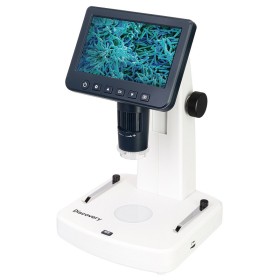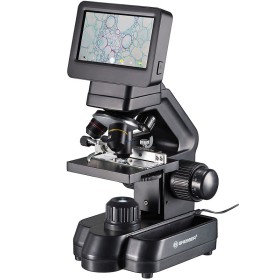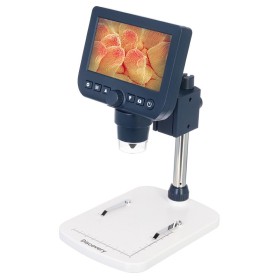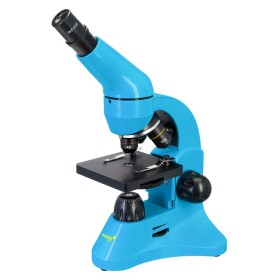by credit card, Paypal and bank transfer.
with BRT, DPD and FedEx couriers
via Whatsapp + 39.371.43.61.201
Research microscope. Designed for the observation of transparent and translucent biological samples, such as smears and cross-sections in transmitted light using the brightfield method. The installation of additional accessories will allow darkfield, phase contrast, differential interference contrast, fluorescence and polarization methods.
The motorized nosepiece and condenser automate the change of lenses and the adjustment of the corresponding lighting system. The settings are not a distraction for the user, who can thus focus his attention on the live search and speed up the procedure.
The microscope lends itself to microbiological analysis, medical diagnostics and the resolution of problems in scientific research.
Microscope head
Trinocular head with infinitely corrected optics. The user selects the most comfortable angle of the microscope head between 0° and 35°. The digital camera can be installed in the trinocular tube. The beam splitter is 0/100, 100/0 or 80/20.
The basic kit includes 10x/25 mm eyepieces with diopter adjustment and long eye relief that allows eyeglass observations.
Objective and objective revolvers
A motorized nosepiece for 6 lenses is oriented inwards: the user is able to see which lens is inserted in the optical path and the space above the stage remains free. Alternatively, an additional lens can be installed in the free slot for extra magnification. The objectives are planachromatic, with a parfocal height of 60 mm.
Above the nosepiece is a socket housing for installing an analyzer, compensators or differential interference contrast sliders.
Remote control of the nosepiece
The microscope's front panel has objective selection buttons. If a button is pressed, the nosepiece automatically sets the selected target to the viewing position. Another button allows you to switch between the most commonly used lenses.
Next to the focus knobs on either side of the body are buttons for rotating the nosepiece.
The position of the light and condenser is automatically adjusted to match the selected target.
These features improve comfort, speed and efficiency. They offer an advantage to microphotography because the shooting conditions remain the same for each sample.
Maintain comfortable brightness levels when the magnification is changed
Objectives with different magnifications transmit light at different levels of intensity every time you change lenses, you need to adjust the brightness of the light. In addition, the brightness increases significantly when you switch from a higher magnification objective to a lower magnification objective. The sharp increase in brightness makes the eyes strain. The MAGUS Bio 290T is equipped with an intelligent brightness control. The microscope remembers the brightness for each objective selected by the user and automatically sets the brightness when the nosepiece is turned. The intelligent control reduces the time it takes to adjust the brightness. MAGUS Bio 290T increases user comfort and saves time even when observations require frequent changes in magnification.
Focus mechanism
The coarse and fine focus knobs are coaxial and positioned low. The researcher can place his hands on the table and assume a comfortable position in front of the microscope.
The coarse focus lock knob helps to quickly adjust the microscope after changing the object of study. The knob is located on the left side of the microscope on the same axis as the focusing mechanism.
The ring on the right side adjusts the tension of the coarse focus screw. The user adjusts the right voltage for observations.
Small table
The coffee table features Gorilla Glass, which is a glass tempered by means of a chemical process. The glass is durable, resistant to chemical and mechanical impact, as well as being easy to clean. The lens holder is secured by two screws and can be easily removed for manual scanning.
The long control handle of the stage ensures comfortable observations: the user's hand rests on the stage effortlessly.
Capacitor
Optimal condenser settings for each objective: Rotatable auxiliary lenses automatically move away from the beam path for low-magnification objectives and return for objectives with magnification greater than 10x. Minor manual operation for quick and convenient operation. The user is also able to individually adjust the position of the capacitor lenses that can be rotated for specific studies.
The condenser is adjustable in height and can be centered. Frame type: dovetail.
The condenser ring adjusts the iris aperture diaphragm. The condenser body features the aperture values in white and the magnification value of the objective lens in color, while the ring features an indicator mark. To achieve contrast on each lens, it is recommended that you rotate the ring so that the indicator matches the aperture or magnification values of the lens you are using.
Lighting
The transmitted light illuminator contains a LED 3 W The color temperature does not change when adjusting the brightness. The life cycle of LED is 50,000 hours.
Köhler lighting in transmitted light
The contrast of the image is adjusted by the condenser's aperture diaphragm, while the illuminated field area is adjusted by the collector's field diaphragm. The field aperture control is located on the lower right body, next to the focus adjustment area, making it easy to set up the Köhler illumination.
Köhler illumination improves the image quality of the observed sample: each objective achieves maximum resolution and the field of view is evenly illuminated without darkening at the edges. The object of study is sharp and has no image artifacts.
Ergonomic design
Physical discomfort causes fatigue and reduces productivity. The ergonomic design of the microscope plays an important role in everyday scientific research. MAGUS Bio 290T offers comfort to the user while working.
The motorized components speed up and simplify repetitive operations, especially when the lens change is frequent.
The user chooses a comfortable angle of the microscope head without straining the back and neck.
The focus knobs are located at the base of the microscope. The user does not need to strain his hands. Thanks to the smooth movement of the mechanism, the user can focus on the object without any problems.
The microscope requires minimal hand movement to use it thanks to the long stage handle and focus handle that are located in the same work area.
Fixings
There is a line of accessories designed for this microscope.
Optional objectives provide additional magnification.
The eyepieces extend the magnification range of the microscope. Additional eyepieces help maximize the potential of the most frequently used lens.
Phase contrast devices, fluorescence components, darkfield capacitors, polarization devices, and DIC devices augment contrast methods by enabling the study of invisible objects in the brightfield.
A digital camera transmits the microscope image to a monitor, stores the files, and the software performs real-time measurements of the samples.
A calibration slide is used to measure the objects, which can be combined with the eyepiece with scale or with the camera software.
Key features:
- Observations of transparent and translucent samples in brightfield and transmitted light
- Trinocular head with a vertical tube for installing a digital camera and adjusting the angle of inclination beam splitter 0/100, 100/0 or 80/20
- Motorized nosepiece revolver that allows you to change the lenses used at the touch of a button convenient panel for remote control of the nosepiece
- The transmitted light illuminator is a LED 3 W energy-saving battery life of up to 50,000 hours
- Köhler transmitted light illumination, motorized condenser with rotating auxiliary lenses
- Intelligent light control system via automatic brightness selection when changing the lens used
- Coffee table with Gorilla Glass tempered by means of a chemical process and long control handle for comfortable working
- Wide range of compatible optional accessories
The package contains:
- Stand with integrated power supply, focusing mechanism, capacitor mount and motorized nosepiece
- Illuminator for transmitted light observations with bulb housing
- Motorized rotating condenser with rotating auxiliary lenses
- Trinocular head
- Planachromatic lens with infinity correction: 4x/0.10, 60 mm parfocal height
- Planachromatic lens with infinity correction: 10x/0.25, 60 mm parfocal height
- Planachromatic objective lens with infinity correction: 20x/0.40, 60 mm parfocal height
- Planachromatic lens with infinity correction: 40x/0.65 (with spring mechanism), 60 mm parfocal height
- Planachromatic lens with infinity correction: 100x/1.25 oil (with spring mechanism), 60 mm parfocal height
- 10x/25 mm eyepiece with long eye relief and diopter adjustment (2 pcs.)
- Eyecup (2 pcs.)
- Optical filter
- C-mount adapter
- AC mains power cable
- Dust cover
- User Manual & Warranty Card
Available on request:
- 10x/22 mm eyepiece with diving scale
- 10x/22 mm eyepiece with reticle
- 10x/22 mm eyepiece with viewfinder
- Eyepiece 12.5x/17.5 mm (2 pcs.)
- Eyepiece 15x/16 mm (2 pcs.)
- Eyepiece 20x/12 mm (2 pcs.)
- Phase contrast device: phase contrast condenser, auxiliary centering telescope, phase objective set
- Darkfield capacitor NA 0.7–0.9
- Darkfield immersion capacitor NA 1.3–1.26
- Device for working with the Differential Interference Contrast (DIC) method
- Illuminator for observations in reflected light
- Polarizer Instrument
- Digital camera
- Calibration slide
- Monitor
| Brand | MAGUS |
| Guarantee | 5 лет |
| EAN | 5905555019482 |
| Package size (LxWxH) | 78x56x57 cm |
| Shipping Weight | 21 kg |
| Type | Biological, Light/Optical |
| Head | Trinocular |
| Seat tube | Beam splitting 0/100, 100/0, 80/20 |
| Cylinder head tilt angle | 0–35°, adjustable |
| Magnification, x | 40–1000 in basic configuration (*optional: 40–1250/1500/2000) |
| Magnification range | 800x to 1280x |
| Eyepiece tube diameter, mm | 30 |
| Eyepieces | 10x/25 with ±5D diopter adjustment, long eye relief (*optional: 10x/22 with scale, 10x/22 with reticle, 10x/22 with viewfinder, 12.5x/17.5, 15x/16, 20x/12) |
| Objectives | Infinity Planachromatic: 4x/0.10 10x/0.25 20х/0.40 40xs/0.65 100xs/1.25 oil Parfocal distance: 60 mm |
| Nosepiece Revolver | 6 lenses, motorized |
| Coffee table, mm | 190x152 mm |
| Range of motion of the stage, mm | 78/32 |
| Coffee table features | two-axis mechanical, with a Gorilla Glass slide |
| Eyepiece diopter adjustment, diopters | ±5D on each eyepiece |
| Diopter adjustment of the eyepiece | Yes |
| Capacitor | motorized rotating condenser NA 0.9/0.25 with swivel front lenses centerable and adjustable in height, with adjustable opening diaphragm dovetail frame |
| Diaphragm | adjustable aperture diaphragm, field diaphragm with adjustable iris |
| Fire | Coaxial, coarse (35 mm, 28 mm/rev, with fixing knob and micrometer screw tension adjustment knob) and fine (0.001 mm) |
| Lighting | LED |
| Adjusting the brightness | Yes |
| Feeding | 100–240 V, 50/60 Hz, AC mains |
| Light source type | LED 3 W |
| Optical filters | Yes |
| Operating Temperature Range, °C | 5 — 40 |
| Extra elements | Automatic brightness adjustment when changing lenses |
| Possibility of connecting additional equipment | Phase contrast devices (capacitor and objectives), darkfield capacitor (dry or oil immersion), polarization instruments (polarizer and analyzer), reflected light illuminator, device for working with the differential interference contrast method (DIC) |
| User level | Experienced users, professionals |
| Assembly and installation difficulty level | complicated |
| Application | laboratory/medical |
| Lighting position | inferior |
| Research method | brightfield |
| Set with case/case/bag | Dust cover |



























